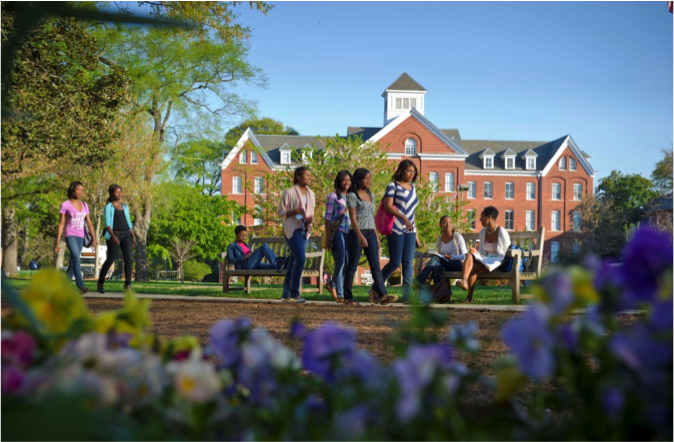Code Green Solutions


Spelman College is one of six universities announcing a new partnership with Chevrolet to reduce greenhouse gas emissions.
Today, Chevrolet announces funding for another six universities, committing to purchase and retire another 36,000 metric tons of greenhouse gas emissions from these campuses toward its 8 million ton goal as part of its $40 million dollar Carbon Reduction Initiative.
Following the lead of Ball State University, Valencia College, University Illinois-Urbana Champaign, Grand Valley State University and Southern Oregon University, six more campuses just announced new project partnerships with Chevrolet to reduce greenhouse gas emissions. These leaders include:
To be eligible to sell their carbon reductions to Chevrolet, all campuses had to deliver GHG reduction performance, either campus wide or for individual LEED®-certified buildings, which ranked in the top 15% of their peers nationally, certifying their credits through the Verified Carbon Standard under the new VCS Campus Clean Energy Efficiency methodology which Chevrolet developed. Going forward, similar funding from the broader U.S. voluntary carbon market can be accessed by other campuses.
The University of Illinois at Chicago’s carbon project focuses on its most recently opened LEED building, the second such LEED carbon project, following Southern Oregon University, in Chevrolet’s portfolio. UIC’s Douglas Hall, a LEED-NC Gold certified building, uses a combination of geothermal technology and solar power to earn up to $39,000 from the sale of certified carbon emissions reductions.
Chris Pyke, USGBC’s vice president of research, recognizes the significance of such revenue streams that can reward leadership and incentivize high performance operations:
“The VCS methodology provides well-deserved recognition for exceptional LEED-certified projects that are designed and operated to reduce emissions and operating costs. It’s a win-win for Chevy and participating universities.”
Chevrolet carbon projects require third party certification for their reductions across their lifecycle. Participating LEED buildings must be exceptional in design and rigorously monitored in operations. This is just the kind of integrated design and operation that reflects and reinforces USGBC’s broad-based push toward real time performance.
USGBC first supported the development of the LEED module in the new methodology to create new carbon incentives in order to monitor and improve LEED building performance in this way.
The other five new projects announced today delivered qualifying project performances on a campus-wide basis, with a combined revenue potential of approximately $1,000,000 over 10 years.
Spelman College’s strong energy efficiency gains reflect its commitment to positive social change. Giving African American young women “A Choice to Change the World,” Spelman students such as Marcea Lewis are already finding ingenious ways to lead toward a lower carbon/energy future: “I believe that living a more sustainable life is something that anyone can do,” remarked Lewis. “It makes me proud to see my school taking these steps to green our campus and set an example for our students to do the same.”
Boston University placed its students at the center of the leadership needed to certify its carbon reduction project. Ryan Peters, a sophomore sustainability intern, anticipated every piece of analysis to sweep his school through the certification diligence needed to validate its project gaining invaluable on-the-job work experience outside the classroom.
As he hit the ground running, Peters noted: “I’ve been working on sustainability since my first day at BU: the Chevy project has given me the opportunity to make an even more significant contribution.”
With students like that, it’s no surprise that Boston University is collaborating with the City of Boston in its pioneering efforts to develop a city-wide climate resilience plan – leadership that the Chevrolet project funding can help to deepen on campus.
However, according to Enid Cardinal, senior sustainability advisor to the president, Rochester Institute of Technology, takes pride in being rated the geekiest campus in the country – and, it believes, the coolest. Its president, Dr. Destler, regularly rides the electric bike he designed around campus when not personally driving his own electric Volt. Innovation and sustainability is deeply rooted in the school’s culture. So Chevrolet’s funding will further drive deep reductions in its energy-based carbon emissions, while RIT’s Venture Creations, its clean energy business incubator, continues to support start-ups with clean energy solutions that can expand these efficiency gains across the country.
University of Wisconsin-Stevens Point similarly seeks to help drive clean energy efficiency throughout its local community: Chevrolet funding was announced today at its community fair held annually on National Campus Sustainability Day. The insights and know-how resulting from the Chevy partnership will help fund additional clean energy initiatives – including a possible wind turbine demonstration now under consideration – which could benefit other local organizations as well.
Portland State University, as an urban campus in a city with a reputation for sustainable leadership, links its campus closely to its Portland community: PSU worked with partners to develop the city’s Electric Avenue where cars like Chevrolet’s Volt can re-charge.
It’s no accident that Portland is at the epicenter of this groundbreaking carbon deal. Portland hosts three of the organizations that helped Chevy pioneer this program: Portland State University with its carbon project, Bonneville Environmental Foundation, Chevy’s buyer agent, and Climate Neutral Business Network, which wrote the third-party certified Verified Carbon Standard methodology, opening the door for campuses to access new carbon market funding.
Like so many university presidents at these Chevrolet project campuses, Wim Weiwel, PSU’s president, sees his role as championing action to address climate change far beyond the university’s own borders:
“As university presidents, we are in a uniquely influential position to not only actually do something about climate change on campus but to also help shape the climate debate across the broader community.”
USGBC sees similar potential to accelerate change beyond these first Chevrolet LEED carbon projects. Since the precedent is now set for LEED buildings to earn carbon credits, it’s possible to use that foundation to expand the new VCS carbon methodology so that other LEED-certified offices, homes and community venues can access such carbon funding. This creates an opportunity for other companies to now partner and build upon these clean energy efficiency gains.
“This work provides both direct and indirect benefits. Universities are mitigating greenhouse gas emissions and reducing operating costs. Many are also buying off-site Renewable Energy Certificates and carbon credits as part of their LEED-certification efforts. This extends clean energy investment beyond the footprint of an individual project or campus,” commented Chris Pyke, Vice President of Research, USGBC. “Moreover, the VCS-approved methodology provides a road-map for other organizations to replicate these practices, benefit from Chevy’s investment, and help reduce global warming pollution.”